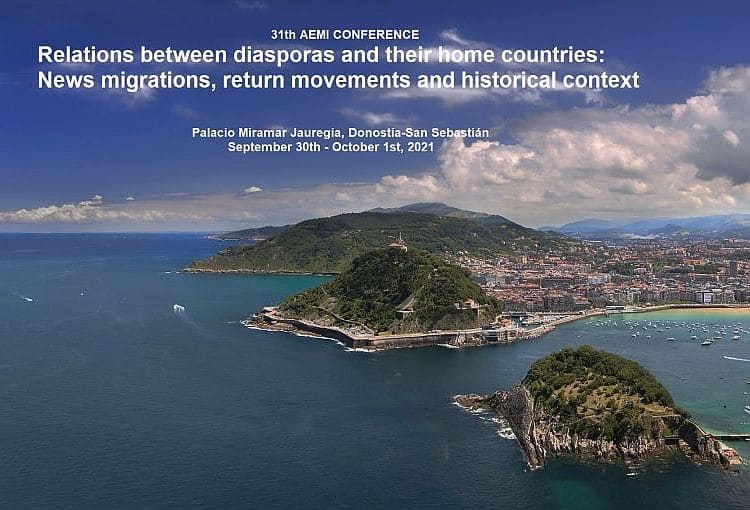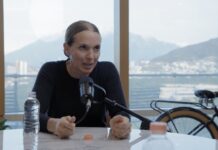As mentioned in earlier entries, the 31st Conference of the Association of European Migration Institutions (AEMI) is getting underway in San Sebastian. This year’s event, organized by the Directorate for the Basque Community Abroad at the Basque Government, has attendees from 17 countries, and is going to be broadcast online.
The Conference, which is being held September 30 and October 1 at the Miramar Palace in San Sebastian, is titled “RELATIONS BETWEEN DIASPORAS AND THEIR HOME COUNTRIES: New migrations, return movements and historical context (roots)”.
The opening event will be tomorrow at 9:00 am (3:00 am in New York) and will be headed by the Secretary General for Activities Abroad at the Basque Government, Marian Elorza, and the AEMI President, Cathrine Kyo Hermansen.
The keynote speaker will be Irishman Kingsley Aikins, who received his degree in Economics and Politics at Trinity College in Dublin, and he will be discussing his dissertation, “Connecting Diasporas”. Aikins has lived and worked in six countries throughout his career in business and investment, philanthropy, education, the diaspora, and tourism, and he has worked for important organizations, governments, and countries.
The analysts who will be participating in this international conference come from Germany, Andalusia, Argentina, Brittany, Denmark, the US, Slovenia, the Basque Country, Flanders, Galicia, Ireland, Luxembourg, Poland, the United Kingdom, and Valencia.
The whole conference will be held in English, and you can join in online at the following links:
September 30 (additional link)
October 1 (additional link).
Program
31st AEMI CONFERENCE
RELATIONS BETWEEN DIASPORAS AND THEIR HOME COUNTRIES: New migrations, return movements and historical context
Palacio Miramar Jauregia, Donostia-San Sebastián
Sep. 30 – Oct. 1, 2021
Thursday, September 30
9:00 Opening
Cathrine Kyo Hermansen, AEMI Chairperson
Marian Elorza, General Secretary of Foreign Affairs (Basque Government)
9:20 Kingsley Aikins, The Networking Institute, Ireland
Connecting diasporas
10:00 Panel 1: Migration flows, connections of diaspora and home
Chaired by Dietmar Osses, AEMI Secretary
Dorota Praszalowicz, Institute of American Studies, Jagiellonian University, Cracow, Poland
Pacific Northwest and the European immigration flows: Toward the comparative history of ethnic groups: Poles, Croatians and Jews
Magdalena Paluszkiewicz-Misiaczek, Institute of American Studies, Jagiellonian University, Cracow, Poland
Polish veterans of WWII in Canada and their peculiar relations with communist Poland
Montserrat Golías, Laura Oso, University of A Coruña, Spain
New and old chains. Analysis of migratory flows between Spain and Argentina
Marina Hansen, University of the Basque Country
Italian immigration and state education in Argentina (1870-1930). A multilingual Buenos Aires
11:30 Coffee-break
12:00 Panel 2: Workshop
Chaired by Belén Fernández Suárez, Antía Pérez-Caramés, University of A Coruña, Spain The Spanish diaspora in Europe: emigration and return of a disenchanted generation
Antía Pérez Caramés (University of A Coruña, Spain), Belén Fernández Suárez (University of A Coruña, Spain), Alberto Capote Lama (University of Granada, Spain)
The new wave of Spanish emigration to France. A comparative analysis of the strategies and trajectories of intra-European migrants
Jordi Giner Monfort (University of Valencia, Spain), Belén Fernández Suárez (University of A Coruña, Spain), Sandra López Pereiro (University of A Coruña, Spain), Rubén Pérez Roel (University of A Coruña, Spain)
The return of new Spanish emigration after the 2008 crisis: motivations for putting an end to the European drea
Antonio Alejo (University of A Coruña, Spain), Luca Chao Pérez (University of A Coruña, Spain), María José Fernández Vicente (Université de Bretagne Occidentale, France), Anna Giulia Ingellis (University of Valencia, Spain) and Ana Irene Rovetta Cortés (CONICET-University of Jujuy, Argentina)
Integration and return policies for the Spanish diaspora: An exploratory overview
13:30 Lunch
14:30 Panel 3: Return migration and identity
Chaired byEmma Barnhøj, The Danish Immigration Museum
Uxío-Breogán Diéguez, Montserrat Golías, University of A Coruña, Spain
The construction of Galicia through emigration: the configuration of a dual and transnational community
Heidi Rodrigues Martins, Centre de Documentation sur les Migrations Humaines, Luxembourg
The Quartier Italien, grounded through return and other mobilities
Dietmar Osses, Industriemuseum Zeche Hannover in Bochum, Germany
Polish, German, European? Experiences of second generation re-migrants in Germany
Anders Osvald Thorkilsen, The Danish Immigration Museum, Denmark
Dead and buried in the diaspora
16:00 Coffee-break
16:30 Panel 4: Home and Diaspora
Chaired by Bram Belaart, Red Star Line Museum, Antwerp
Iker Arranz, California State University, Bakersfield, USA
The vanishing of home. Reflections on the diaspora relations with borders and identity
Argitxu Camus, Iker Research Center, Bayonne
Letters sent by a Basque immigrant woman in the US to her hometown (1921-1967)
Susana Sabín-Fernández, United Kingdom
Volver
Joseba Etxarri
Euskalkultura
Tana Garrido, Basque Country
La tierra llama, a documentary about women in Cuba
Friday, October 1
09:00 Panel 5: Migration and Diaspora in the 21st Century: Pandemic as challenge
Chaired by Anders Osvald Thorkilsen, The Danish Immigration Museum
Gorka Alvarez Aramburu, Director for the Basque Community Abroad, Basque Government
Public administrations in the face of the new migration of the 21st century
Igor Calzada, University of Cardiff, Univervsity of Oxford, United Kingdom.
Hyperconnected Diasporas Amidst Pandemic Citizenship: The End of the Global Ciziten?
10:30 Coffee-break
11:00 Panel 6: Basque Diaspora: Communities and identities
Chaired by Emilia García, Consello da Cultura Galega, AEMI Board
Oscar Alvarez, University of the Basque Country
Diaspora and Basque national symbolism in the making
Maialen Goirizelaia, University of the Basque Country
One diaspora, different communities
Imanol Galdos, Donostia-Kultura, Basque Country
Why are they leaving and not returning? Disconnection with the homeland. Is there a risk of Argentineation of the Basque society?
Iván Jiménez, Bizkaia Talent, Basque Country
Professional emigrants: Be Basque as an Integrative Strategy to deal with the challenges of the internationalization and lack of talent
12:30 Lunch
13:30 Panel 7: Workshop
Chaired by Mirjam Milharčič Hladnik, Slovenian Migration Institute: State- diaspora relations in the context of shifting borders and changing political regimes: identities and transfers of knowledge
Miha Zobec
Diasporas and their many “homelands”: the emigrants of Julian March and Prekmurje and the interwar Yugoslavia
Aleksej Kalc
Triestines in Australia: From identifying locally to welcoming the Italian “giuliani nel mondo”
Klara Kožar Rosulnik
Challenges and opportunities for knowledge transfer from Slovene diaspora
15:00 Coffee-break
15:30 Panel 8: Workshop
Chaired by Benan Oregi, Officer for the Basque Community Abroad, Basque Government
Peter Loge, George Washington University; Ander Caballero, International consultant, USA
The rhetorics of diaspora engagement
Ziortza Gandarias, John Bieter, Nere Lete, John M. Ysursa, Meggan Laxalt, Boise State University, USA Boise, Idaho.
Connecting Academic Boise and other diaspora communities, and the Basque Country
Last Updated on Sep 30, 2021 by About Basque Country





